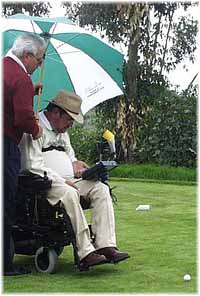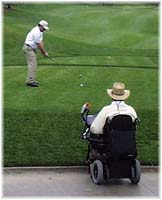REDMOND, Wash., Aug. 18, 2000 — When most of the golfers tee off today at the Real Abilities Charity Golf Tournament, they won’t use golf clubs.

A mobile computer attached to Hank Torres’ wheelchair allows him, and others with disabilities, to play golf alongside traditional golfers.
They will study the fairway ahead of them, move their head slightly, and suck in one cheek or blow in a straw. And their ball will fly toward the flag on the first green.
Real Abilities is like no golf tournament ever held. It is believed to be the first on an actual golf course that includes players with no use of their arms or legs. They will golf alongside non-disabled partners, using portable computers loaded with Microsoft’s Links LS 2000 software and other assistive technology.
The tournament, being held at the Pelican Hill Golf Course in Newport Beach, Calif., is just one example of how computer games are opening up new worlds for people with disabilities. These games provide an opportunity to play sports and adventure games against all comers on a level playing field. So level, in fact, that a Links player with multiple sclerosis has become the Tiger Woods of virtual golf, winning nearly every tournament he enters and leading the Virtual Golf Association (VGA) Tour, a Microsoft-sponsored simulation of the PGA tour that hosts more than 100,000 players daily.
Though games such as Links are designed for all types of players, improving the lives of people with disabilities is a prime focus for Microsoft, said Gary Moulton, group product manager for Microsoft’s Accessibility and Disabilities Group. Many of the company’s leading products include features designed for people with disabilities. Most recently, Microsoft included a narrator, on-screen keyboard and text magnifier in Windows 2000 for those who don’t have other accessibility software. Microsoft is also developing voice recognition software that allows computers to process spoken commands.
“Microsoft understands that technology enables all individuals to do more, to be more productive and to have more fun — whether the person is using Windows 2000 or Links LS,” Moulton said. “Once a person with a disability has access to technology, everything else becomes less restrictive. If they can use a PC or get on the Web, who cares if they have an adaptive keyboard or mouse or if they can’t see the screen?”
Staying in the Game
Jim Burns doesn’t. A bicycling accident last year forced Burns, 42, to quit his job and stop playing racquetball, golf and other sports the way he had since he was a child.

Randy Marsden, whose company developed an infrared control device that allows people with quadripilegia to use computers, tees off while Hank Torres prepares to make a shot on his computer.
With time on his hands and in nearly constant pain from nerve damage suffered in the accident, Burns needed an outlet, something to do while his wife was at work. So, he tried some of the computer games he’d heard about but had never had time to play.
He soon became hooked on Links LS, a computer game golfers can play alone or against other gamers on simulated courses, such as Pelican Hill. He now plays every day — up to 16 hours a day — against a vast network of friends and fellow golfers, whom he has met on the Zone.com, a Microsoft Web site where gamers play Links and other games.
“Before I started playing Links, it was hard. It was devastating,” Burns said about the daily pain and life changes due to permanent nerve damage to his left leg. “Quite frankly, Links made it easier for me to cope with the changes in my life.”
Links and other computer games, such as virtual pool, added competition to Garry Anderson’s life for the first time since he was severely injured in a 1972 auto accident. Although he now has only limited use of his arms and no use of his fingers, he plays by controlling a track ball with the outside of one hand.
“Being able to compete is important,” said the former baseball and football player from Redlands, Calif. “You know how men are. They love to compete. I figured that was over for me.”
Simulated sports are often the most popular computer games for people who have disabling injuries, said Russ Holland, program director for the Alliance for Technology Access. The organization offers 41 centers across the United States where people with disabilities can sample and learn how to use technology.
“For somebody who acquires a disability, there are all these things they are told they can’t do anymore. Finding an alternative is so critical to morale,” Holland said.
For children with disabilities, he said, this simulation can be even more important in the acquisition of skills and experiences necessary to flourish later in life. “They may not be able to get down in the sandbox,” Holland said. “But if we can simulate that sandbox in a game, they can have some of those same experiences.
Often, games are also the easiest way to teach computer skills to children with disabilities. They can learn how to type or use assistive technology while they are playing, Holland explained.
Building Camaraderie
As important as competition, gamers with disabilities say, is the camaraderie and human contact computer games provide — especially the new online games that allow players to compete and talk to their teammates and opponents on the Internet.
Because their disabilities often make it hard to get out of the house, many people with disabilities have a “huge void” of human contact, said John LeDell, director of Golfcom.com, an online site where Links players compete in tournaments. “They may only see other people a couple of times a week,” LeDell said, who contracted polio when he was 2 years old and now uses crutches to help him walk. “Someone without a disability probably sees that many people every minute of the day when they are working.”
Burns has amassed a list of 500 fellow “Linksters” from all over the world with whom he plays and has formed friendships. When the pain from his leg keeps him up at night, he flicks on the computer. “There is always, always, always one of my friends online,” Burns said. “Sometimes we’ll play. Sometimes we’ll chat.”
He and a golf mate from Norway plan to meet in person in Las Vegas later this year. “It’s the greatest ‘Catch 22,'” Burns said. “If I hadn’t gotten injured, I wouldn’t have all these great friends.”
The conversation gets so loud when Paul Willey, an avid Links player with multiple sclerosis, plays live, head-to-head rounds, that his wife and two children leave the room.
“They are always laughing and joking and ripping each other,” said Willey’s wife, Lori-Ann. “They have a great time.”
Changing Attitudes
Willey does most of the laughing. Although his disability limits his playing time to a few hours each morning, Willey is considered the best Links player in the world. He has won more than 200 online golf tournaments and leads the inaugural VGA Tour, winning the first three events by seven, six and three strokes, respectively. The winner of the tour, which concludes with a special event in Hawaii in November, will receive $100,000.
Willey, 37, began playing early versions of virtual golf years before he was diagnosed with MS in 1996. He began dedicating more time to Links when his diminishing health forced him to leave his military career in 1995.
Gaming has become such an important part of his life that Willey has created a Web site ( http://www.withoutwheels.org/ ) for gamers with disabilities to share their stories. If he wins the VGA grand prize, he plans to purchase 100 copies of Links LS and donate them to people with disabilities who don’t have the game.
“I can’t imagine where I’d be without Links,” Willey said.
Two years ago, a life-threatening reaction to his medications required Willey to receive two blood transfusions and spend more than a week in the hospital. Worried about getting rusty at Links, Willey spent the days visualizing the timing of his “swing,” created by clicking a computer mouse at precisely the right time. When he returned home from the hospital, he shot a 17-under par round at the virtual Mana Kia Golf Course in Links’ toughest player mode. “I’ve never duplicated it,” Willey said.
Golfcom.com’s LeDell sees Willey as a role model for others with disabilities, living proof that people who use wheelchairs or have other physical challenges don’t always have to finish second to people without disabilities. He also expects games such as Links to change the way people view disabilities. If those with disabilities can compete on a level playing field, their handicaps become insignificant.
“People begin to realize,” LeDell said, “that those with disabilities aren’t as different as they first appear.”
Everybody Plays
Computer games are gradually becoming accessible to all gamers, regardless of ability. A handful of developers are creating Windows-compatible games for the blind that use elaborate soundscapes to help players navigate mazes or blast bad guys.
Microsoft continues to make its computer operating systems more adaptive, said George Allen, program manager for the company’s Accessibility and Disabilities Group.
“We’re making our products more accessible. That makes games more accessible as well,” he said.
Microsoft also is working with makers of gaming controls to allow even those with almost no mobility to play. The Tracker 2000, a device made by Madentec of Edmonton, Alberta, Canada, lets people with quadriplegia play Links LS by manipulating an infrared beam of light. The beam shines from a camera attached to their computer, bounces off a tiny reflective dot they wear on their forehead, and goes back to the computer screen. Every shift of the head moves the computer cursor. They blow in a straw or suck in their cheek muscles to click the mouse button.
Madentec and Teddy’s Star Foundation, providers of assistive technology for those with severe disabilities, arranged the Real Abilities Charity Golf Tournament. In addition to the PGA golfers, U.S. Sen. Max Cleland, D-Ga., is scheduled to participate and offer the keynote speech at a dinner tonight.
While the PGA and other golfers play the course the traditional way, 15 golfers with disabilities will travel alongside them, using Tracker 2000 to control portable computers attached to their wheelchairs. Response to the event has been so great that a tent has been set up at the golf course for additional golfers with disabilities to play from a distance.
During a practice round in April, Hank Torres, a Links golfer from Austin, Texas, who is a quadriplegic, teamed with three traditional golfers at Pelican Hill. They played a team game called “Best Ball,” the same game the golfers will play today. All four hit tee shots and the team took turns advancing the shot that came closest to the hole. To translate Torres’ shot, the team consulted Links’ location meter, then drove to the exact spot on the golf course, using global positioning satellite (GPS) devices on the golf carts. The team ended up using Torres’ shots much of the time, because he best navigated Pelican Hill’s shaggy roughs and hills.
“It totally turned the tables,” said Madentec President Randy Marsden. “Hank was often the best golfer.”
With games such as Links and devices such as Tracker 2000, Marsden sees no limit to gaming opportunities for those with disabilities. “If we can do this now,” Marsden said, “imagine what those with disabilities will be able to do in a few years.”
Watch out, Tiger Woods.




